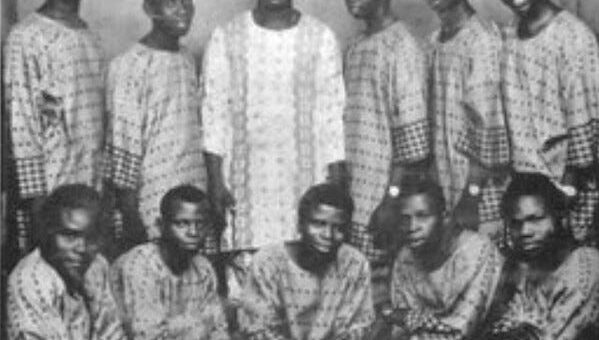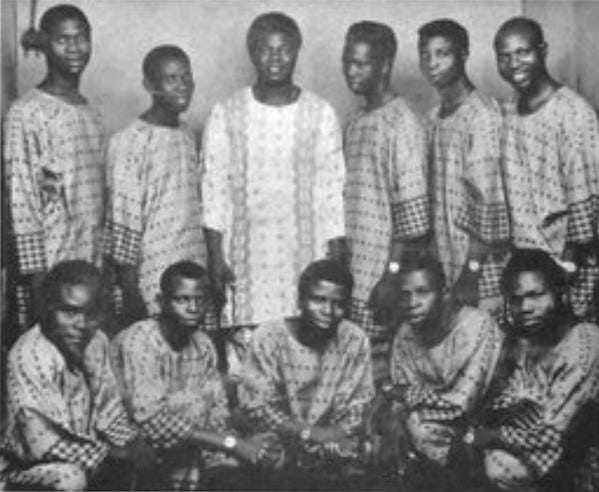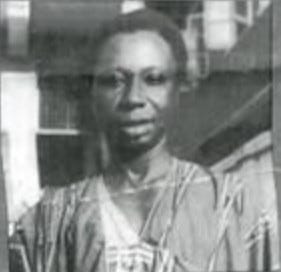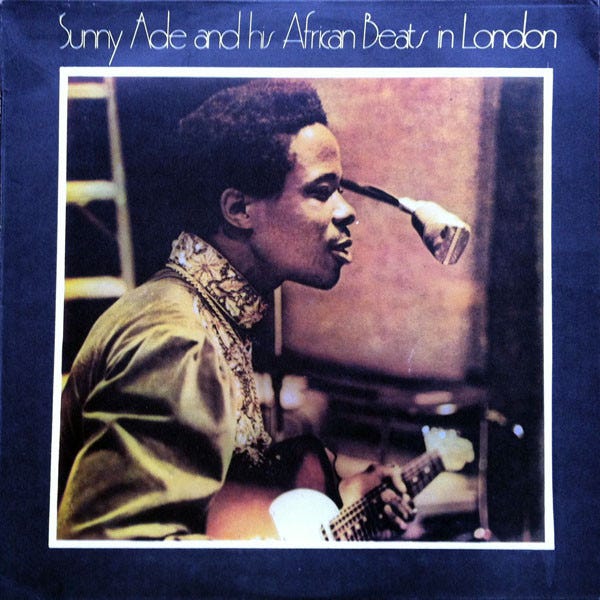
1.
A stray tweet has haunted me all week. I do not remember the tweet verbatim, but it was something like…the music of our father stays with us forever. Like most social media maxims, this tweet demands some introspection. Naturally, it called up the music of my father—his JVC deck connected to his Kenwood amplifier routed to the wooden Akai speakers from which his favourite music spewed.
We are back to our flat in Ado-Ekiti, which smells of boiling beans and locust beans. My father loved all sorts of music but was particularly partial to Juju. Every so often, he would sing along to the stray Bob Marley or Kool and the Gang tune on the radio. Sometimes, we were all charged with looking for his missing tapes, notably Bob Marley’s Kaya—but his real doting was reserved for Juju’s finest: King Sunny Ade and Chief Commander Ebenezer Obey.
Chief Commander Ebenezer Obey and his Band
I don’t think he had a favourite. Obey was reserved for long road trips. As a child, I was sometimes irritated by the monotony of Obey’s music. Obey is a fine lyricist with a great voice, and this often carried his philosophical views thinly disguised in didactic tales about modern or folksy Yoruba life. His conservative approach to experimentation contrasted with Sunny Ade’s dynamism.
Dad was joyous whenever he listened to King Sunny Ade. He became his boyish self, his one-sided dimple on display. He would throw the occasional dance moves in tandem to the groove of those talking drum solos. My father’s best Juju album would have paired Sunny’s dance medleys and Obey’s sermonising, but in the 90s, the playlist did not exist.
2.
Juju music is marketed as purely dance music in the West. This is half true. Once Juju music moved out of Highlife’s flatshare courtesy of 1970s Nigerian petrol-oil dollars, it adapted its mode to better suit its listeners. The two sides of wax were ample.
Side A is a stretch, a side-long medley of dance music. Side B was for contemplative listening. It focused on a specific message, a dirge or a bespoke praise song for a wealthy or influential patron or statesman, or a sermon. Unlike Side A, Side B was often conservative in musical experimentation, spotlighting instead lyrical composition, arranged in call and response. Side B was Juju close to its roots, full of wisdom and social commentary. Side B was vintage Theophilus Iwalokun, Ojoge Daniel, Ayinde Bakare and Ambrose Campbell. Side B was early modern Juju, which was performed sitting down, like older genres Sakara and Apala.
Ayinde Bakare
3.
To be a Nigerian Millennial is to come of age in decline. Growing up, the political prospects of our oil-rich country had declined. This decline had far-reaching consequences, chief among which was the dearth of culture. Nigeria in the 90s was full of interesting music, a potpourri of foreign influences of reggae, dancehall, disco, and funk, but it lacked a vibrant emotional resonance.
There were no tangible memories to tie this music to. My older cousin loved Mike Okri in the 90s. Recently, she turned 50 but has no memories of his debut album. For twenty years, I have searched in vain for a demure lovers rock song about evidencing one’s love sung by a female Nigerian musician. The chorus haunts me once a week. It goes something like, Evidence/proves your love/Evidence/proves your love/Evidence proves your loooooveee.
A lot of the 90s music has disappeared, and there ought to be a book or documentary focused on pre-Afrobeats 90s music. The music of Esse Agesse, Colours Band, Tunde and Wunmi Obe, Felix Liberty, Alex O, Segun Arinze, Zubbby Enebeli, Daniel Wilson, Orit Wiliki, Candy Sea, Ras Kimono, Majek Fashek, etc. Truth be told, Juju music experienced a creative drought through the 90s. Fuji fared much better–far more accessible to the working class. Their needs and linguistic invention bolstered the form from the grassroots, while the charisma of its front guards continued to give the genre its credibility.
Being a Nigerian Millennial also means we claim Afrobeats to be ours. We supported that music through the 2000s as its earliest patrons, and we ought to have memories tied to it. The Afrobeats song that holds my most visceral experience is Klever Jay’s ‘Koni Koni Love’. MI Abaga’s debut album, Talk About It, was the most crucial album from that era. Its stark lyricism oscillating between social commentary and the lived experience of the 90s decline, at its most serious, this album told the story of the collapse of Nigeria’s middle class. Politically charged Afrobeats music existed in this era. Ditto for social commentary that addresses immediate societal ills. But this much cannot be said for music that elevates one into another philosophical plane. Music that lifts you in a crane towards your deepest fears and ambitions. Music that attends to urgent needs, be it existential or material. Music that instructs.
Music should meet two needs—contemplative listening and dance. Afrobeats, sadly, fails in the former, its failure worsening as time passes. Early Afrobeats albums curated music that was not for dance. Wande Coal’s joyous Mushin 2 Mo’Hits had political songs that gave thanks to a higher being. Ditto for 2Face’s debut and his phenomenal sophomore album. Afrobeats came into its own when there was a shift in how music was sold. Cassettes were going out of fashion for the Compact Disc(CD). The CD had no clear division; this may have significantly influenced how music was curated. In cassette form, Paul Play’s first album, Project 1 (released by Kennis Music in 1999), kept the R&B songs separate from Juju/Highlife tunes.
To be fair, Afrobeats has seen cassettes decline, compact discs rise and fall, and streaming’s rise. How have these changes in technology impacted how this music is curated?
Not quite the cop out, Afrobeats continues to fail to address the need for music for contemplative listening.
4.
I have written excessively about King Sunny Ade’s Sweet Banana. It’s lush and sensual music helmed by Sunny Ade’s buttery tenor. Music so smooth, it approaches a celestial alchemy. Almost no wrong note in sight. Pitched to perfection, this album introduced the English word Banana into the Yoruba lexicon, a metaphor for the phallus. Phallus, the placeholder for pleasure. A totem that survived the Juju genre and leapt into Afrobeats. But all that smut business is Side A Sweet Banana.
Side B sharply contrasts the carnal with the christianly, the secular with the solemn, pornography with piety. Two sides cannot be more opposite. After you have been figuratively teased with Sunny’s neologism, ‘Jinginrin’, an ornate and onomatopoeic verb for sex, Side B begins with a meditation on friendship.
According to Sunny, there are two kinds of friends. Those who love you and those who don’t. The difference is that those who don’t love you would put up a performance that suggests that they do. There goes your difficulty: telling them apart. Sunny also identifies a third kind of friend, the one whose love is perfect as to make the ultimate sacrifice, Jesus Christ. This segue into the gospel is so seamless, you could play Side B Sweet Banana in church.
Juju’s gospel influences are well documented. The prosody of Christian hymns has been with the genre since its early days. For Sunny Ade and his African Beats, the first overtly gospel album, is called Sunny Ade and his African Beats in London. Recorded in London in 1977, on Side A is ‘Emi Agbadura’, a sprawling medley of praise songs to God. A patchwork of guitar riffs and talking drum percussion, ‘Emi Agbadura’, which means, I will pray, is effortlessly smooth–but Side B Sweet Banana is smoother, livelier, and full of storytelling.
Once the story about friendship leads us to Jesus, the betrayal of Judas Iscariot is discussed to create contrast. There is no talk of Pontius Pilate or the State. It is all about friendship and how deliberate actions can cost lives. Sunny sets the scene at Golgotha, where Jesus was crucified, stoned, and pierced on his side. No graphic detail is spared in this melancholic tale. It is the Passion of Christ done Juju style.
5.
No song warned me that my 30s were for losing friendships and dissolving strong bonds that I thought were time-tested. Watching those bonds singe like burning animals has been a horror of flashbacks and nightmares. It has pushed me to the tether of sanity and forgiveness, not of the other parties but of myself, for letting the guards slip.
You have likely courted like minds if you have been motivated or talented in your 20s. Over time, the natural order of things is to become collaborators. Those sorts of projects are entered with kilojoules of passion, and this is okay since most of these passion projects fail. But for the successful exception, you may have to contend with more than just passion. If you haven’t assessed your partner’s character and constitution for their ambition, love, fickleness, and stability, you may find yourself in a fix in your 30s.
My mother, bless her, always said friendships need to be evaluated constantly. This means anyone who hasn’t reached out to you or whom you haven’t reached out to after a while should be re-assessed. This is a tenuous way of saying friendship requires nurture, presence, and communion. All three are enshrined in staying in touch, active listening, reaffirming, and not taking each other for granted.
Older friendships risk taking each other for granted. Worse when significant life changes happen. In your 30s, the major disruptor is a new partner or significant life changes (loss of parent/guardian). It behoves you to be present for your friend if the latter happens. Your friend should look out for you when the former happens. Many spouses lead each other down the tragic fate of Macbeth. One would assume that two heads are better than one, not if they collude in cooking delusions.
You can form delusions of your own by not communicating, by not being transparent, and by nurturing your friendship on past assumptions that do not take into account the small but definitive ways we all change. In your 30s, ambition replaces love, hunger replaces devotion, affection and intimacy are delivered from more physical and enduring relationships, and camaraderie replaces spirited competitiveness. Navigating all these changes by offering grace, presence, and language is what good friends do.
It is okay for friendships to expire. Let them go. The Yoruba say 20 children cannot play for 20 years. Expectedly, they outgrow the play, the playground, and each other. But the beauty of it all is that we can nurture new friendships in our 30s, 40s, and 50s. With your time-tested BS detector, you may be able to tell Sunny Ade’s two kinds of friends apart. This will have to do until Afrobeats makes for contemplative listening.


